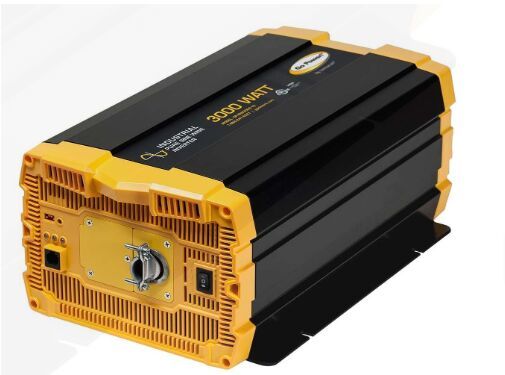Inverters come in many different shapes and sizes, and they vary in many ways. There are two main contrast characteristics between different types of off-grid inverters:
The type of power output is classified according to the sine wave used-corrected or pure sine wave. Compared with improved sine wave inverters, Photonic Universe only stocks pure sine wave inverters, which are more efficient and have a wider range of applicable equipment that can power them.
What is the internal frequency of the inverter circuit running at low frequency or high frequency (not to be confused with the AC output frequency, which is the standard 50Hz of our inverter).

low frequency power inverter
Low frequency inverters have advantages over high frequency inverters in two aspects: peak power capacity and reliability. Compared with high frequency inverters, low frequency inverters are designed to handle higher power spikes for a longer period of time. There may be many reasons for power peaks (for example, power tools, pumps, vacuum cleaners and other equipment with motors that require high starting power); when inverters encounter such peaks, they can tolerate a short period of time before shutting down Increased power to prevent any damage to it.
Compared with high-frequency inverters, low-frequency inverters have larger peak power capacity to cope with large loads with power spikes. In fact, low-frequency inverters can operate at peak power levels up to 300% of their nominal power levels for several seconds, while high-frequency inverters can operate at 200% power levels for a fraction of a second . The second major difference is reliability: low-frequency inverters operate with powerful transformers, which are more reliable and robust than MOSFETs of high-frequency inverters, which use electronic switches and are more prone to damage, especially at high power levels under.
In addition to these qualities, low-frequency inverters also have a wide range of technical features and functions that most high-frequency inverters lack. These include built-in battery charger; UPS (uninterruptible power supply) function; bypass mode without battery connection; power saving mode; various charging settings (such as different battery types and charging voltages).
In terms of other differences, low-frequency inverters are designed for large off-grid power systems and are more suitable for powerful equipment. Therefore, they are usually within the high power category of inverters, and their power levels are usually within thousands, usually 2000W-3000W and above (high frequency inverters can also be used in lower power categories, such as 300W, 600W, 1000W, 1500W, etc.) Also, in most cases, low frequency inverters do not include power sockets-they have terminals on which AC wires should be connected, and then connect them to the power socket.
Low frequency inverters are not for everyone. They are very large and heavier than high-frequency inverters, and are best suited for those who are building off-grid power systems without major power restrictions, or running powerful appliances and equipment such as electric motors, washing machines, vacuum cleaners and air conditioners. Low-frequency inverters are also most suitable for people who want to power various kitchen appliances such as refrigerators, microwaves, dishwashers and ovens.
The enhanced peak performance capacity and higher reliability of low frequency inverters means that their cost is higher than that of high frequency inverters. If you don't consume a lot of energy and only need small devices to supply power, or the inverter has limited space, then a high frequency inverter will be more suitable for you.
For those who have a large number of powerful appliances where standard power is limited or not available, low-frequency inverters are still a considerable investment. Coupled with a suitable solar kit, the low-frequency inverter can not only provide a reliable backup power solution, but also can completely replace conventional electricity with the same quality power source. Considering the possibility of failure of low-frequency inverters, the price paid for low-frequency inverters should be regarded as a long-term investment compared with high-frequency inverters. They are indeed bigger, stronger and stronger.